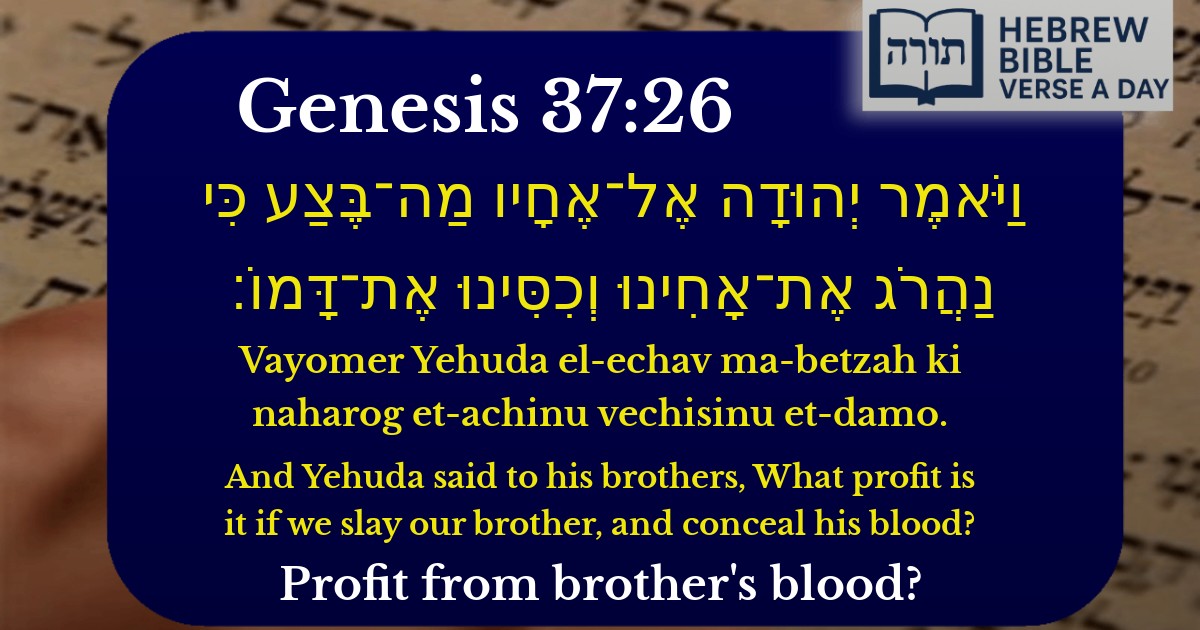Join Our Newsletter To Be Informed When New Videos Are Posted
Join the thousands of fellow Studends who rely on our videos to learn how to read the bible in Hebrew for free!
Hebrew Text
וַיֹּאמֶר יְהוּדָה אֶל־אֶחָיו מַה־בֶּצַע כִּי נַהֲרֹג אֶת־אָחִינוּ וְכִסִּינוּ אֶת־דָּמוֹ׃
English Translation
And Yehuda said to his brothers, What profit is it if we slay our brother, and conceal his blood?
Transliteration
Vayomer Yehuda el-echav ma-betzah ki naharog et-achinu vechisinu et-damo.
Hebrew Leining Text
וַיֹּ֥אמֶר יְהוּדָ֖ה אֶל־אֶחָ֑יו מַה־בֶּ֗צַע כִּ֤י נַהֲרֹג֙ אֶת־אָחִ֔ינוּ וְכִסִּ֖ינוּ אֶת־דָּמֽוֹ׃
וַיֹּ֥אמֶר יְהוּדָ֖ה אֶל־אֶחָ֑יו מַה־בֶּ֗צַע כִּ֤י נַהֲרֹג֙ אֶת־אָחִ֔ינוּ וְכִסִּ֖ינוּ אֶת־דָּמֽוֹ׃
🎵 Listen to leining
Parasha Commentary
📚 Talmud Citations
This verse is quoted in the Talmud.
📖 Sanhedrin 6b
The verse is referenced in a discussion about the importance of justice and the consequences of shedding innocent blood.
📖 Bava Metzia 85b
The verse is cited in a discussion about the ethical behavior of Yehuda and his brothers, emphasizing the moral lesson against harming others.


Yehuda's Argument Against Killing Yosef
The verse (Bereshit 37:26) records Yehuda's plea to his brothers not to kill Yosef. Rashi explains that Yehuda was concerned with the practical consequences of their actions, asking "what profit" (מַה־בֶּצַע) they would gain from murdering their brother. According to Rashi, Yehuda was not primarily motivated by moral considerations at this point, but rather by the lack of benefit in such an act.
The Meaning of "Covering His Blood"
The phrase "וְכִסִּינוּ אֶת־דָּמוֹ" ("and conceal his blood") is interpreted in several ways by the commentators:
Yehuda's Leadership Role
The Midrash (Bereshit Rabbah 84:16) notes that this incident marks the beginning of Yehuda's emergence as a leader among the brothers. The Talmud (Sotah 10b) explains that Yehuda was rewarded for saving Yosef's life by having kingship descend from him, as it states (Bereshit 49:10) "The scepter shall not depart from Yehuda."
Theological Implications
The Malbim emphasizes that Yehuda's argument contains an implicit theological message - that violent actions against family members are ultimately counterproductive. He notes that the term בֶּצַע (profit) often refers to ill-gotten gains (as in Yeshayahu 56:11), suggesting that no true benefit can come from such wrongdoing.